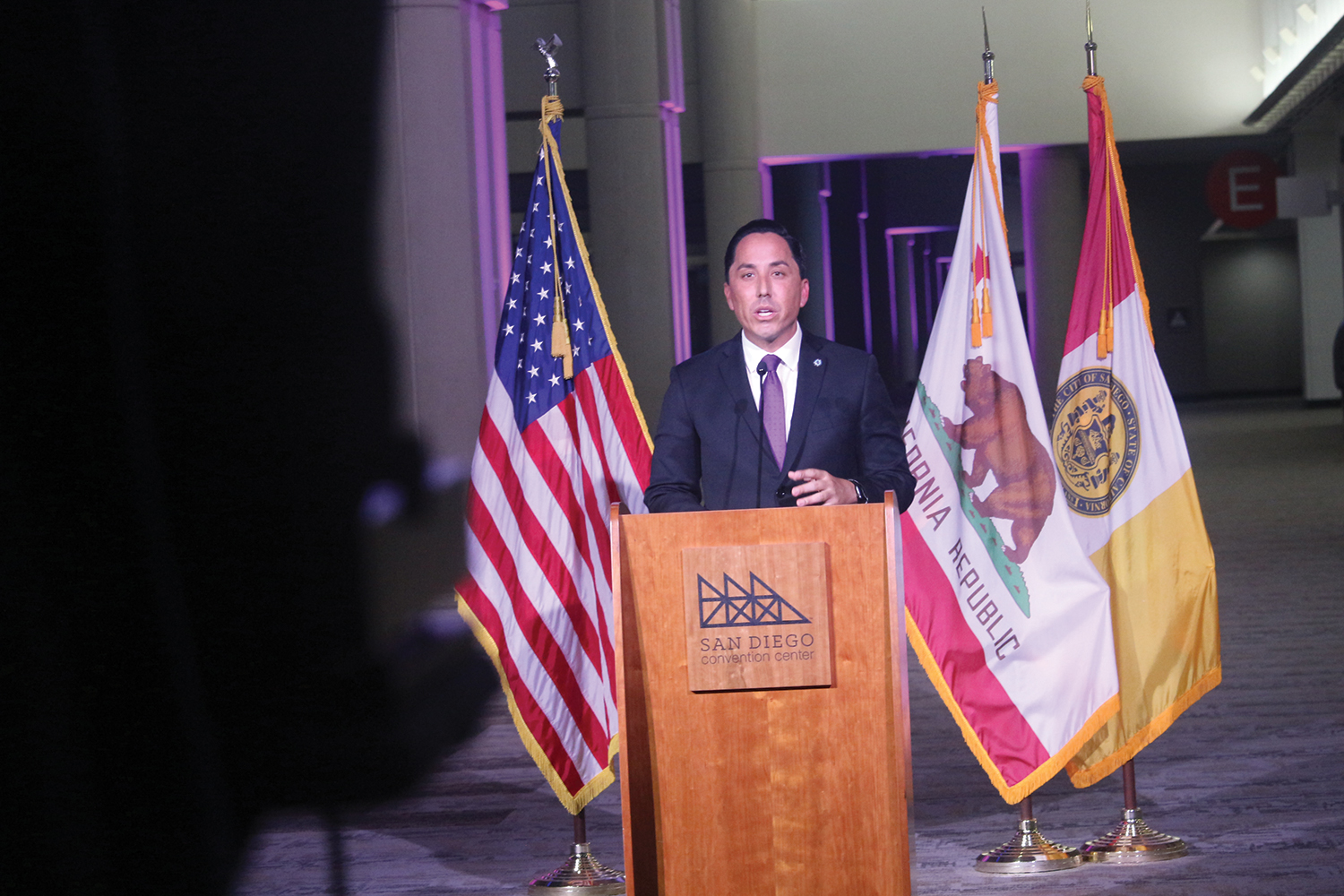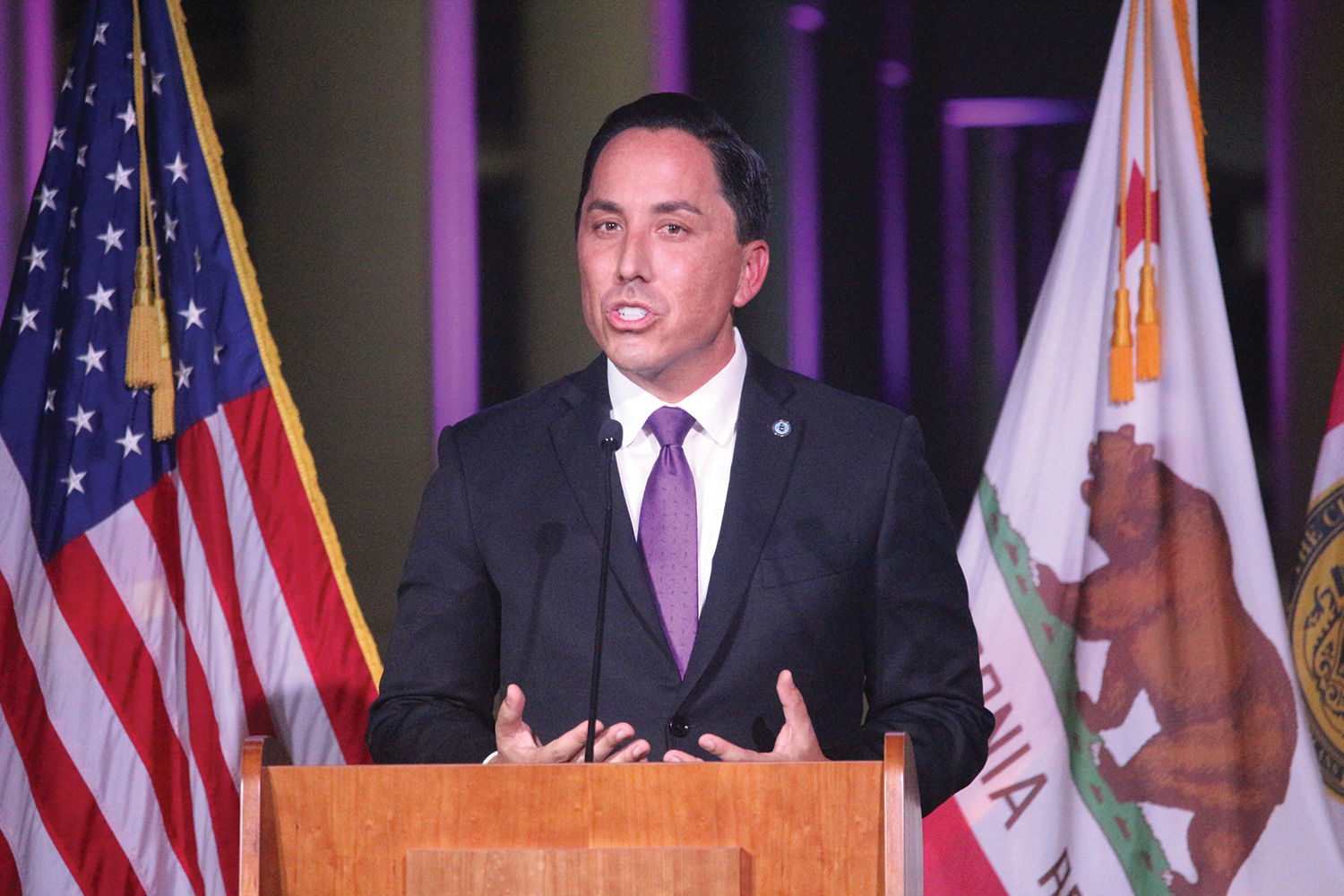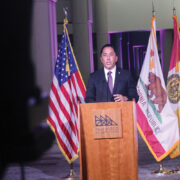
SAN DIEGO – In his second State of the City address as the 37th Mayor of San Diego, Mayor Todd Gloria on Wednesday, January 12 spoke decisively and unflinchingly about some of the most pressing problems facing the City of San Diego – specifically, the city’s homelessness and housing crises, the decades-in-the-making infrastructure backlog and public safety amid rising crime.
“Let’s be clear,” Mayor Todd Gloria said. “Under no circumstance is it compassionate to let a person live on the street.”
He was frank about the difficulty of addressing the challenges facing San Diego.
“I’d love to rehash the past year’s many wins on climate, transportation, fiscal discipline and more – and to celebrate the people and organizations who made them happen because I’m proud of them,” he said. “But the last two years have left all of us short on patience for happy talk.”
But the Mayor ultimately struck an optimistic tone, pointing out that the city is in a transitional period and declaring it “ready” to turn the corner and take its place among the greatest in the United States.
“I ran for this office on the promise of reinvigorating San Diego with a jolt of big-city energy, fostering a culture of ‘YES’ that will help us ascend to our rightful place as one of the greatest cities in the country,” said Mayor Gloria. “As I consider the progress we’ve made and the work the lies ahead – I can say that the State of our City is ‘ready.’”
Homelessness
Devoting the largest segment of his address to the homelessness crisis, Mayor Gloria detailed the progress the city made in 2021 on building out its comprehensive, coordinated system of outreach, shelter and supportive housing.
Recognizing that housing is the ultimate solution to homelessness, the Mayor noted that 132 new apartments for chronically homeless San Diegans were created last year, and that nearly 1,000 more are in the pipeline in 2022.
He also pointed out that the city has added more than 200 temporary shelter beds since April 2021 – a 21 percent increase – and that the city is actively vetting multiple locations for additional beds.
While the city augments services for those who accept help, there is a sizable segment of the unsheltered population that is not capable of making the decision to seek assistance, Mayor Gloria said. To help those San Diegans, the Mayor said he intends to pursue legislation to reform state conservatorship laws.
“One of our society’s most egregious failings is neglecting to care for people suffering from severe mental illness,” the Mayor said. “So, this year, I am pushing for state action on conservatorships so that people who cannot help themselves aren’t left vulnerable to the dangers of life on the streets.”
Housing
The housing-affordability emergency was a major focus for Mayor Gloria in 2021, when he launched his “Homes For All of Us” initiative, which includes two Housing Action Packages containing more than a dozen reforms and Blueprint SD, which will speed up updates to community plans to allow for more housing faster.
As part of the initiatives, the Mayor announced that the city will opt in to Senate Bill 10, state legislation that will make it far easier to build small apartment projects close to mass transit.
He also announced a new city program – “Bridge to Home” – that assists affordable-housing developers with the gap financing they need to get their projects over the finish line.
Seven projects have been selected to receive roughly $32 million in assistance from Bridge to Home. All told, Mayor Gloria said, these projects will create 662 new apartments for low-income San Diego families and individuals, including 193 supportive units for formerly homeless residents – 35 of which will be set aside for those who struggle with serious mental illness.
“The shortage of homes everyday San Diegans can afford is splitting up families, making it harder for our businesses to attract and retain high-quality workers, and threatening to deprive our region of the talented young people we work so hard to educate in our world-class universities,” he said.
“We are legally and morally obligated to plan for more growth and add more than 100,000 new homes during the next eight years, and, folks, we are getting it done.”
Infrastructure
Commenting on the San Diego’s decades-long neglect of its core public infrastructure systems, Mayor Gloria said the city in 2021 invested nearly $1 billion in streets and roads, sidewalks and streetlights, stormwater collection, recycling systems, parks, libraries and more.

The Mayor focused heavily on street repair, noting that the city in the past has racked up miles of slurry-seal maintenance on side streets while delaying more costly repaving and reconstruction projects on major roads. In 2021, he rolled out his Sexy Streets initiative that will repair 54 miles of heavily traveled thoroughfares, especially those in historically underserved communities.
“Rather than chalking up miles of easy fixes in cul de sacs,” Mayor Gloria said, “We’ll be diligently restoring segments of the roads most traveled, like Euclid Avenue, Skyline Drive, Orange Avenue, Balboa Avenue and Clairemont Mesa Boulevard.”
Also last year, Mayor Gloria kicked off construction of Phase 1 of the Pure Water program, the biggest infrastructure project in the city’s history, which will supply San Diego with nearly half its water by 2035 and reduce the amount of treated sewage discharged into the ocean by more than 50 percent.
In 2022, Mayor Gloria said, he’ll launch a major infrastructure initiative that will be modeled after his “Parks For All of Us” program, replacing a siloed funding model with a new citywide system to prioritize improvements in communities that need the most attention.
“I’ll be honest with you,” he said. “These improvements are costly, and they take time. But we are doing everything we can to streamline these projects and get them done as quickly as possible. Our public infrastructure is the foundation for a high quality of life, and improving our core systems is a top priority of mine.”
Public safety
Noting that San Diego has seen the same rise in crime that other cities are experiencing, Mayor Gloria said he is committed to providing the city’s public safety departments with the resources they need to keep residents and visitors safe.
Crime rose in San Diego by 13 percent in the past year, with violent crime up nearly 11 percent. Hate crimes increased by 65 percent.
“Lawlessness will not rule the day in our city,” said Mayor Gloria. “We will continue to provide our police department and City Attorney the resources they need to keep you and your family safe, and respond to crime, and hold criminals accountable.”
At the same time, he said he shares the public’s concern about incidents of police misconduct and that San Diego is committed to eliminating excessive use of force, racial profiling, and any abuse by law-enforcement officers.
The Mayor said he looks forward to signing an ordinance that implements the voter-approved Independent Commission on Police Practices and a Privacy Ordinance that will allow the city to deploy more tools to keep communities safe without infringing on privacy rights.
“A great city can fully fund and support its law enforcement officers while also ensuring they honor their oath,” he said. “We can and will strike the balance between protecting our residents and respecting their civil rights and their privacy.”







